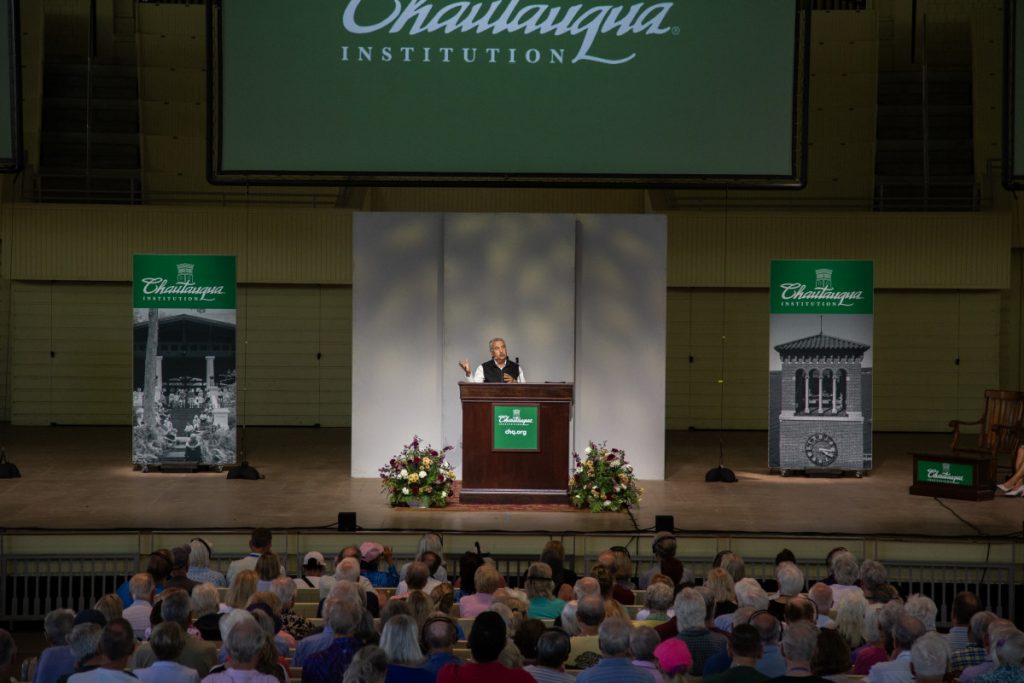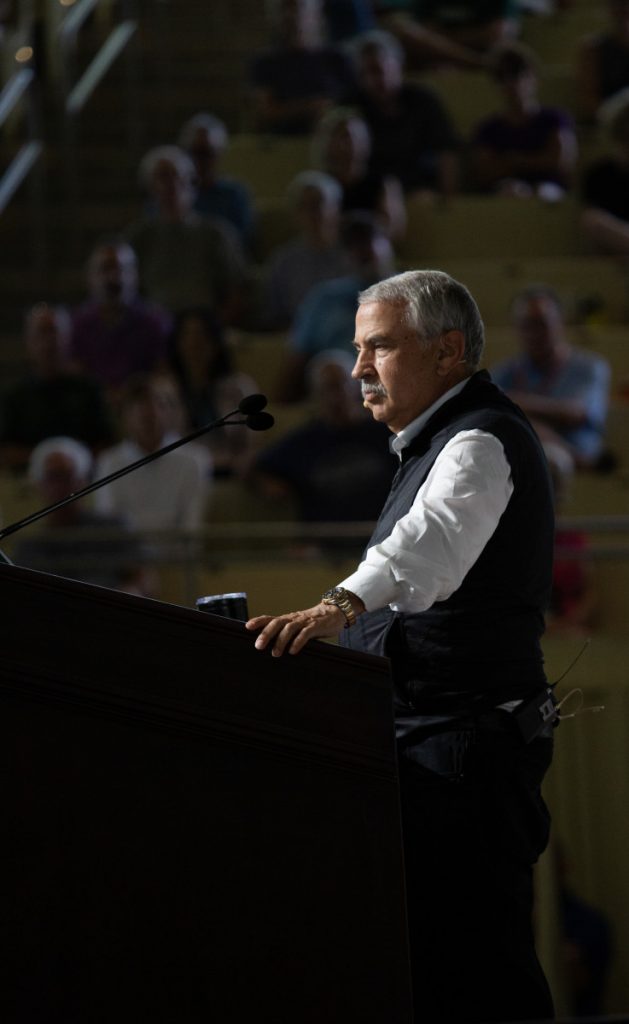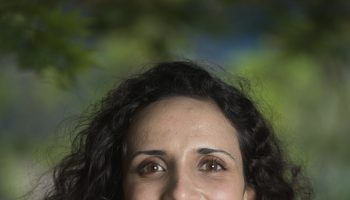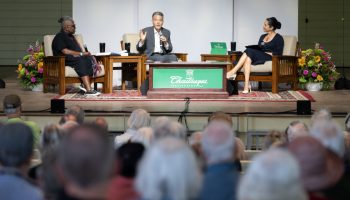
Cody Englander
Staff Writer
Thomas Friedman opened his lecture Friday morning with a question: Since 2023, what have been the two largest geopolitical events destabilizing the world?
To Friedman, the answer is “the fact that Ukraine was trying to join the West, and Israel was trying to join the East. Russia stopped the first, Iran and Hamas tried to stop the second.”
Friedman, a three-time Pulitzer Prize winner and foreign affairs columnist for The New York Times, has covered international affairs since 1981 — with a focus on the Middle East. Speaking at 10:45 a.m. Friday in the Amphitheater, he closed out the Week Eight Chautauqua Lecture Series theme “The Middle East: The Gulf States’ Emerging Influence.”
Ukraine trying to join the West and Israel trying to join the East, Friedman said, represents “what’s been going on globally, I would argue, for the past three years,” and reflects a larger struggle between two networks — a longer one, too, going back to the end of the Cold War.
There’s what he called the “resistance network,” made up of Iran, Russia, North Korea and sometimes China. This network has been, in some ways, in conflict with what Friedman refers to as the inclusion network, made up of the European Union, the United States, some Gulf States and U.S. allies in Asia — “Not all democracies,”
he said. “It’s democracies plus decencies.”
How did the world get to this point? Friedman pointed to the pivotal year of 1979. He noted the Iranian Revolution, but “the second big thing that happened, it was actually bigger than the Iranian Revolution in retrospect,” Friedman said. “But very few people actually even know about it or saw it at the time. And that was the takeover of the Grand Mosque in Mecca by fundamentalist Jihad militants.”

When the Saudis were able to regain access to the Grand Mosque after a month, they immediately executed the militants.
“The Saudi response to that attack was to take Saudi Arabia and the entire Arab Muslim world on a giant right turn,” Friedman said. “… The Saudi family at the time said, ‘That’s not going to happen again.’ And the way they defended themselves from that not happening again was to take Saudi women off Saudi TV, Saudi airline attendants off Saudi Air, by unleashing the religious police on the streets, to basically give the religious authorities
total control or near total control over the Saudi education system.”
Other events that year included: the Soviet Union’s invasion of Afghanistan, the Three-Mile Island nuclear accident, Israel and Egypt’s signing of the Camp David Peace Treaty, the creation of the European Parliament, and the establishment of the Dubai-based Emirates Airlines.
“Now, between 1979 and the early 2000s, much of the Arab world began to drift. First of all, Saudi Arabia’s right turn, its giant right turn, had a hugely negative effect on the region,” said Friedman. “Saudi Arabia is the Germany of the Persian Gulf. It’s the economic engine. And when it drifts, as it did to the far right, it affected basically the whole region.”
Friedman said he once wrote that the dominant ideology in Saudi Arabia at the time wasn’t Islamism, communism or socialism: “They had one 85-year-old leader after another who thought that reforming at about 5 miles per hour was just the right speed.”
With conservatism on the rise, it’s been impacting much of the younger demographic, much of Saudi Arabia being under 30.
“I have often said that in the Middle East, there’s no more dangerous cohort than a group of young men who have never held a job, power, or a girl’s hand,” Friedman said. “… This giant cohort started to build up in the region in a very destabilizing way.”
There were three responses to this rising problem, he said.
“But the diagnosis came out in 2002, it was a very, very important report by the UNDP, UN Development Program. It was called the Arab Human Development Report, right after 9/11,” said Friedman. “It basically said the Arab world today is suffering from a deficit of women’s empowerment, a deficit of knowledge, and a deficit of freedom.”
One of these responses was Bin-Ladenism. Bin Laden was able to take advantage of these young men, believing that issues arose from drifting away from Islam. He believed that building strength came from purging current regimes and operating systems.
“I called him the super-empowered angry man,” said Friedman.
The second response — albeit delayed — was the Arab Spring, a push to liberalism and democracy.
“It was a diagnosis that what ails our society is the lack of freedom, women’s empowerment, and knowledge,” said Friedman. “It began with a moment of humiliation. A vegetable seller was slapped in the face by a Tunisian woman, a policewoman for pushing his food cart somewhere it shouldn’t have been. And his response was the match that set off the Arab Spring.”
The third and final response, Friedman said, was Dubaiism.
“It was basically to say ‘Look, we’re not going to have democracy here,’ ” Friedman said. “‘But we are entitled to expect and leaders are responsible to deliver a world where our people can realize their full potential and be connected with the deepest global economic and technological trends.’”
After the terrorist attacks on Sept. 11, 2001, Friedman recalled being “one angry American.” He had the belief that Saudi Arabia’s ideologies and money was a contributor to the attacks and argued it in a series of published columns.
“With all due humility, I became a big problem for them,” he said.
Then, in 2002, received a call from the spokesman of the Saudi embassy, inviting him to visit. Friedman accepted. Before visiting, he wrote a column — in the form of a “letter” from President George W. Bush to the heads of the Arab League.
“The key line was ‘I suggest you have a summit with one simple resolution, the members of the Arab League say in return for the West Bank in Gaza, we offer full regularity to Israel, full peace with all 22 Arab states,’ ” Friedman said.
His first week visiting Saudi Arabia was “pretty ugly.” At the end of the week, he was invited to dinner with the Crown Prince. Afterwards, they went to his office.
“He said to me, ‘Have you broken into my desk?’ I said, ‘What? Have you broken into my desk?’ ‘No,’ I said, wondering what he was talking about,” Friedman recollected. “ ‘The reason I ask is that this column you wrote is exactly the idea I had in mind. Full withdrawal from all the occupied territories in accord with the UN.’ ”
The speech was written and in the Crown Prince’s desk drawer.
While it wasn’t published as is, Friedman transcribed the speech as an interview and published it in his column.
“All hell broke loose in the Arab world, “ Friedman said.
A summit was called to take what was the Saudi Peace Initiative and turn it into the Arab Peace Initiative — which the Arab League endorsed, Friedman said. But the evening of the proposed summit date, a suicide bomber killed 19 people and injured 172 at a seaside hotel. The day was the start of Passover. Hamas claimed responsibility for the attack.
“That’s how they greeted the first Arab, pan-Arab peace initiative,” Friedman said. “Saudi Arabia, fortunately, was not on the march.”
Instead, the king of Saudi Arabia, who never attended college, began a scholarship program for Saudi students to study abroad, courtesy of the Saudi government, to get degrees in America or the West.
“Men and women and these students, by the way, came not just from elite families, but from some of the poorest villages in Saudi Arabia,” Friedman said.
After the king died, his son Mohammed bin Salman Al Saud took over, realizing the country needed a radical change. Friedman traveled to Saudi Arabia to meet him.
“He was there to reverse 1979. And in my view, nothing could be more important, Friedman said. “So those of you who follow me know I made a big investment in him.”
Once the country began to move away from 1979, liberation came with it.
“Now this had several effects,” Friedman said. “The most important is that it shifted the entire center of gravity of the Arab world from Egypt, Syria, Lebanon, Iraq to the Gulf. And it shifted it on terms that I think were very good — where leaders competed not for resistance, but over resilience.”
And yet, to Friedman, the forces of resistance and the forces of inclusion are still battling each other. After Oct. 7, 2023, he noted it is not yet over.
“(This is) a moment of incredible peril, but incredible opportunity,” he said. “I think that no one could do better to enhance this than if President Trump called up Prime Minister Netanyahu and said get your hostages, get out of Gaza, end the war. Open negotiations for a Palestinian state.”
There is an opportunity to “actually cement this inclusion network. I believe we have the best opportunity not just for peace, but peace between Israel and Lebanon, Israel and Syria, Israel and Iraq. It will be very, very hard,” Friedman said. “But it would be heartbreaking if Israel were to miss this incredible moment of opportunity and get mired in this moment of peril.”




